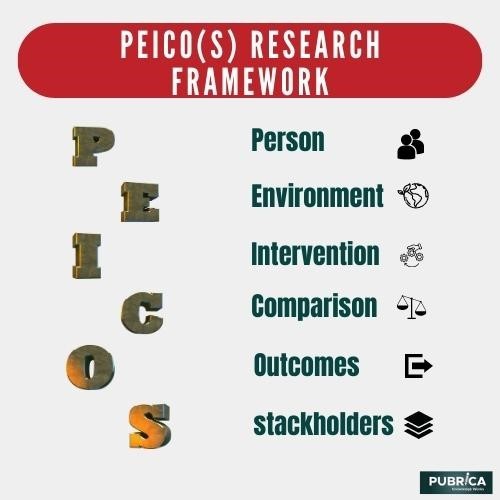PEICO(s) research question framework
The Person-Environment-Intervention-Comparison-Outcome-Stakeholders (PEICOs) framework is a research question framework commonly used in evidence-based practice and clinical research. It provides a systematic approach for formulating research questions and designing studies to evaluate the effectiveness of interventions.
The framework consists of Six key components:

- Person: This component focuses on the characteristics and attributes of the individuals or population under study. It includes factors such as age, gender, medical condition, socioeconomic status, and other relevant demographic information.
- Environment: This component refers to the context or setting in which the intervention is delivered. It could be a clinical setting, community, workplace, or any other relevant environment. The environment may influence the outcomes of the intervention, and considering this factor is crucial for understanding the broader impact of the intervention.
- Intervention: This component involves the specific treatment, program, or intervention being studied. It could be a drug, therapy, educational program, behavioural intervention, or any other type of intervention designed to change a person’s health or well-being.
- Comparison: This component compares the intervention of interest with an alternative or control condition. The purpose of including a comparison group is to determine the effectiveness of the intervention by evaluating its outcomes in relation to a reference group. The comparison could involve a placebo, standard care, alternative or no treatment.
- Outcome: This component identifies the specific outcomes or endpoints that are being measured or evaluated in the study. These outcomes can be objective (e.g., blood pressure, mortality) or subjective (e.g., quality of life, patient satisfaction) and should be relevant to the research question and the population of interest.
- Stakeholders: The stakeholders component considers the perspectives and interests of individuals or groups affected by the intervention. This includes patients, healthcare providers, policymakers, community members, and other relevant stakeholders. Incorporating stakeholder perspectives helps align the intervention with their needs, values, and priorities.
By incorporating all these components into the research question, the PEICOs framework helps researchers formulate well-defined and comprehensive research questions. It ensures that the research is focused on evaluating the effectiveness of interventions in specific populations, within specific environments, and with relevant outcome measures. This systematic approach enhances the validity and applicability of the research findings, thereby supporting evidence-based decision-making in clinical practice and policy development.
References
Methley AM, Campbell S, Chew-Graham C, McNally R, Cheraghi-Sohi S. PICO, PICOS and SPIDER: a comparison study of specificity and sensitivity in three search tools for qualitative systematic reviews. BMC Health Serv Res. 2014 Nov 21;14:579. doi: 10.1186/s12913-014-0579-0. PMID: 25413154; PMCID: PMC4310146.
